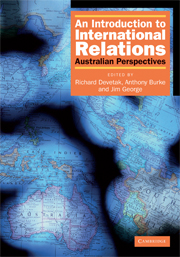Book contents
- Frontmatter
- Contents
- List of tables, figures and boxes
- List of contributors
- Preface and acknowledgments
- An introduction to international relations: the origins and changing agendas of a discipline
- 1 Theory and practice in Australian international relations: the search for identity and security
- Part 1 Theories of international relations
- Part 2 The traditional agenda: states, war and law
- Part 3 The new agenda: globalisation and global governance
- 20 Multilateral economic institutions
- 21 Global trade
- 22 Global finance
- 23 Non-state actors: multinational corporations and international non-governmental organisations
- 24 Global poverty and inequality
- 25 Globalisation and its critics
- 26 The globalisation of Islam
- 27 Global terrorism
- 28 Humanitarianism and armed intervention
- 29 Human rights
- 30 Migration and refugees
- 31 Global environmental politics
- 32 Global governance and the United Nations
- Glossary of terms
- Bibliography
- Index
- References
23 - Non-state actors: multinational corporations and international non-governmental organisations
from Part 3 - The new agenda: globalisation and global governance
- Frontmatter
- Contents
- List of tables, figures and boxes
- List of contributors
- Preface and acknowledgments
- An introduction to international relations: the origins and changing agendas of a discipline
- 1 Theory and practice in Australian international relations: the search for identity and security
- Part 1 Theories of international relations
- Part 2 The traditional agenda: states, war and law
- Part 3 The new agenda: globalisation and global governance
- 20 Multilateral economic institutions
- 21 Global trade
- 22 Global finance
- 23 Non-state actors: multinational corporations and international non-governmental organisations
- 24 Global poverty and inequality
- 25 Globalisation and its critics
- 26 The globalisation of Islam
- 27 Global terrorism
- 28 Humanitarianism and armed intervention
- 29 Human rights
- 30 Migration and refugees
- 31 Global environmental politics
- 32 Global governance and the United Nations
- Glossary of terms
- Bibliography
- Index
- References
Summary
Introduction
World politics has always had a plurality of players. The key is not so much to determine which have primacy, but how they interact to produce the prevailing order. This chapter is structured around a discussion of multinational corporations (MNCs) and international non-governmental organisations (INGOs) respectively. Each is discussed in terms of first, the degree to which it has transnationalised, second, the extent to which it constitutes a social formation able to exert international agency, and third, the degree to which it is able to marshal political influence and status. It is argued there is no necessary antagonism between state and non-state realms. Instead, relations between state and non-state forces are intermeshed, and shaped by broader systemic conflicts. The chapter charts material class antagonisms that shape the role of MNCs and INGOs, and argues that these generate patterns of transnational contestation within international relations.
In the post-Cold War context, globalisation theory made considerable headway. For hyperglobalisationists at least (see chapter 25), newly powerful transnational forces were overwhelming state and interstate incumbents. With US power embedded in a range of interstate frameworks, a model of multilateral unipolarity appeared to be emerging – a model wherein US dominance was embedded in and restrained by a network of multilateral institutions. More recently we have seen the advent of a significantly more unilateralist unipolarity, as the US increasingly disengaged itself from multilateral institutions by adopting exceptionalist and preemptive doctrines. The consequences for globalisation theory have been wide-ranging.
- Type
- Chapter
- Information
- An Introduction to International RelationsAustralian Perspectives, pp. 272 - 282Publisher: Cambridge University PressPrint publication year: 2007



